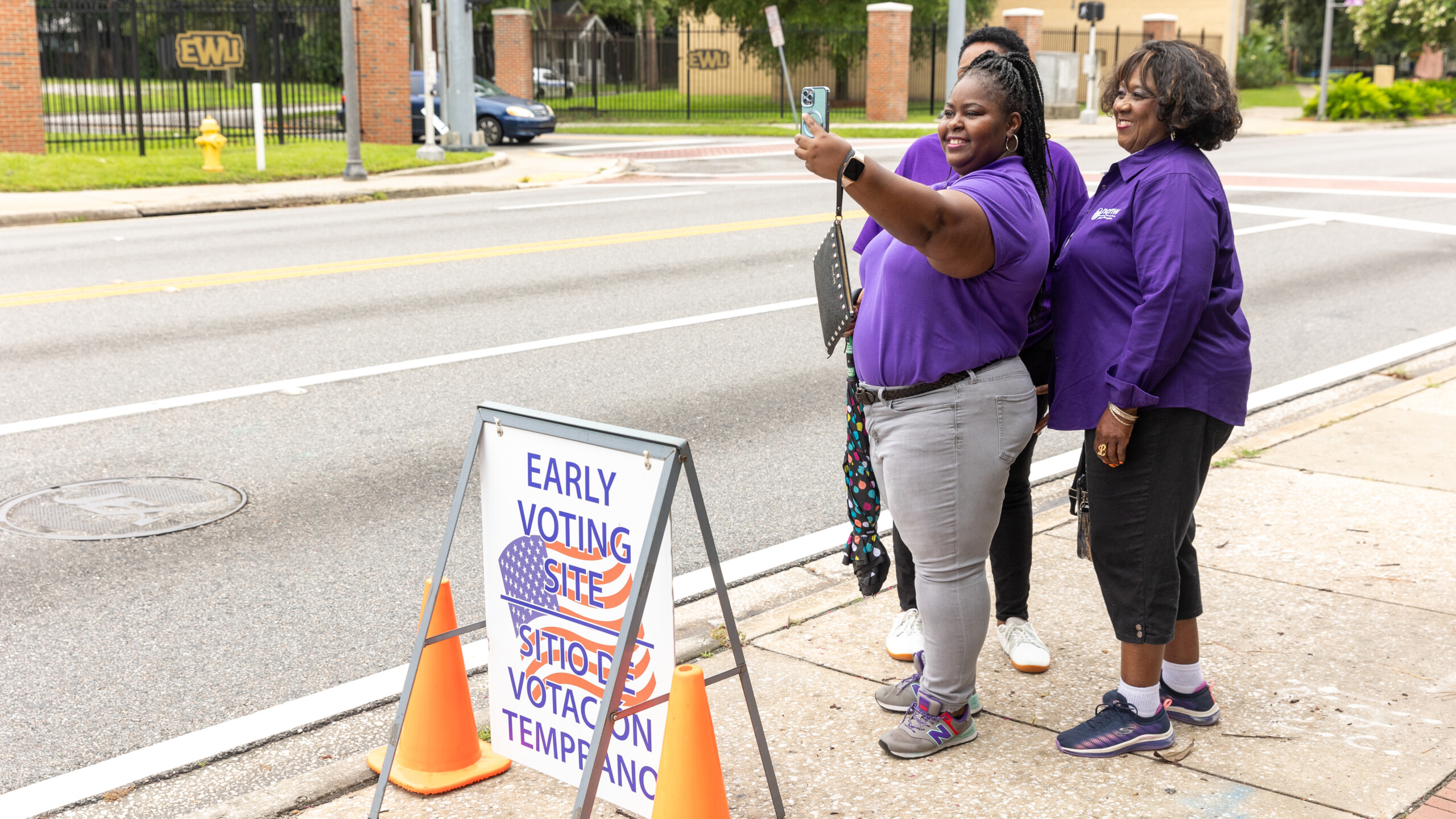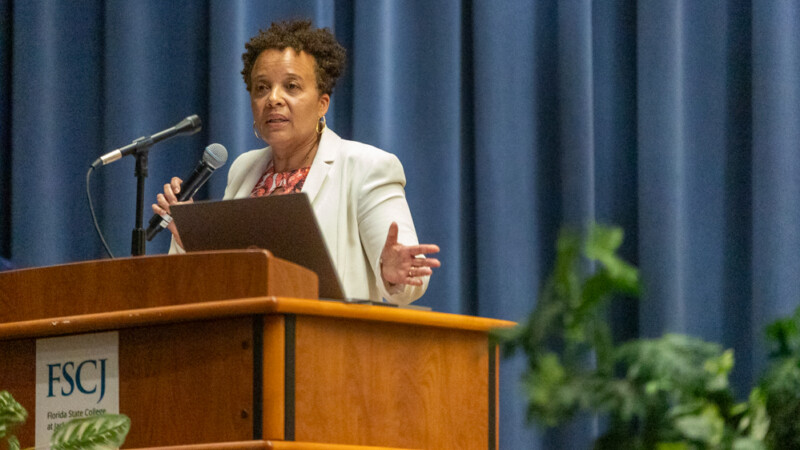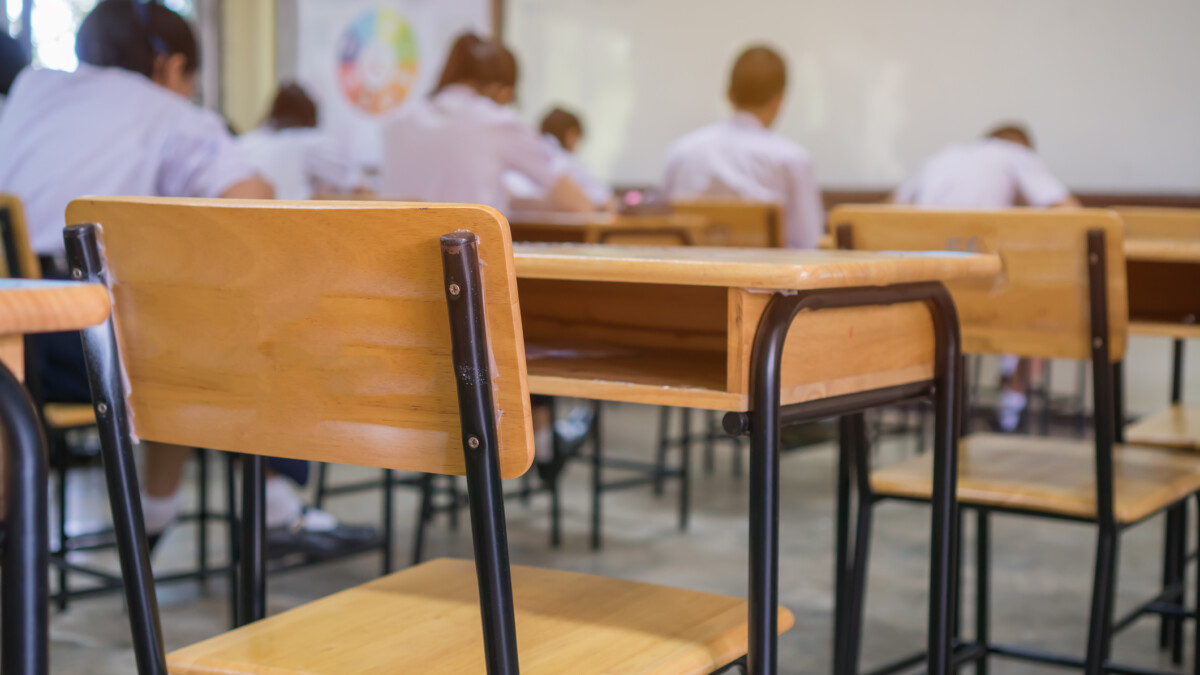Duval County may have the highest percentage of Black voters in the state, but the question this political season is how many melanated souls will make it to the polls.
When an early voting site opened on the campus of Edward Waters University on Wednesday morning, it illuminated a multiyear effort from local civil rights organizations to return a precinct to the Schell-Sweet Community Resource Wellness Center on the campus of Florida’s oldest historically black college or university. It’s a site situated in the heart of New Town, a predominantly Black neighborhood.
“Every voice matters. This early voting site sends a powerful message about the importance of an inclusive democracy and reinforces the idea that all communities deserve equitable access to the voting process,” says Northside Coalition president Kelly Frazier.
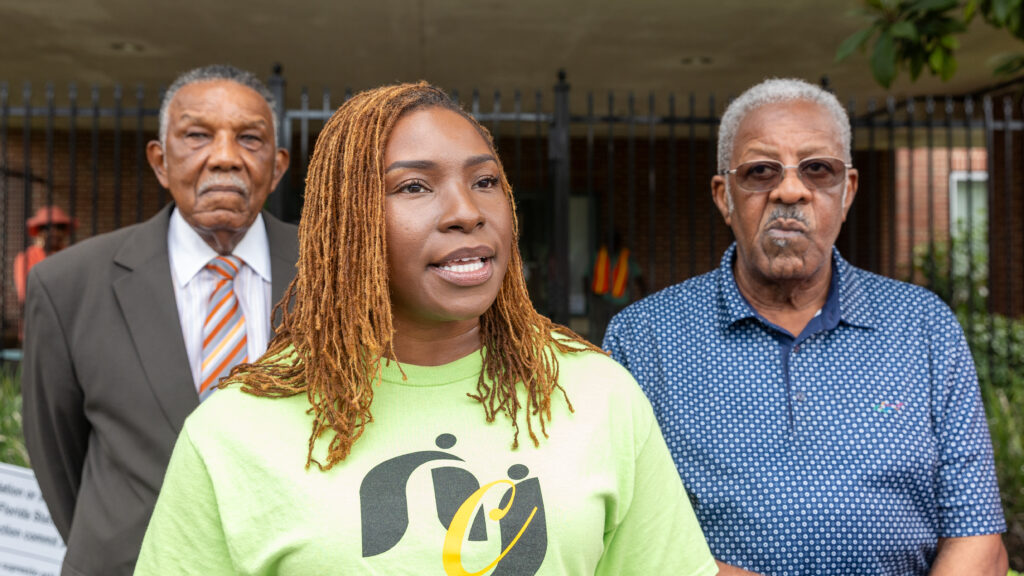
The Northside Coalition was among the groups that pushed Duval County Supervisor of Elections Jerry Holland to return an early voting precinct to Edward Waters this election season.
Holland says his goal was to have an early voting site within five miles of every Duval County voter. Edward Waters sits in the heart of a community with pockets of high poverty and difficulty accessing transportation.
TeKeia Anthony is the executive director of the A. Philip Randolph Institute for Law, Race, Social Justice and Economic Policy at Edward Waters University. She says the presence of an early voting site on campus is more than symbolic.
“Having a voting site in the New Town area that is located on the corner of Pearce and King is extremely important,” Anthony says. “We have a shared space with Schell-Sweet. To be in the New Town Success Zone, that is going to be significant for African American voters in Jacksonville, especially those located in Northwest Jacksonville.”
In the four countywide, general elections since Gov. Ron DeSantis eked past Andrew Gillum in 2018, Black voter turnout in Duval County has not exceeded the countywide percentage.
When Donna Deegan was elected as Jacksonville’s mayor in May 2023, only 33.1% of voters participated. Only 29.1% of Black voters cast a ballot — a gap of 4 points.
When DeSantis overwhelmingly won reelection in 2022, Duval’s Black voter gap was 9.7 percentage points.
When President Joe Biden won in 2020, the Black voter gap was 5.1 percentage points.
Lenny Curry was reelected as Jacksonville’s mayor in 2019 with just 14.4% of the overall electorate participating, and just 11.8% of Black voters.
A Jacksonville Today analysis indicates that, over the past two decades, Black voters flock to the polls when a Black person is on the top of the ballot at the local, state or national levels.
A total of 77.3% of Duval’s Black electorate voted when Barack Obama won the White House in 2008 — more than the historic 77% total participation.
University of Florida professor Sharon Austin believes the presidential campaign of Vice President Kamala Harris will encourage a spike in voter registration and turnout similar to Obama’s first national campaign in 2008 and Gillum’s run in 2018.
Southside resident LaTeisha Reynolds and Westside resident Sharon Rashad had their sights set on campaigns closer to home. Rashad says presidential elections may receive outsized attention, but it’s paramount that voters pay attention to, and vote in, local elections.
Reynolds and Rashad snapped a selfie with Lucretia McBride on Wednesday morning before the three walked inside to vote.
“Early voting is important, especially to support Edward Waters University and go ahead and get our votes counted,” Reynolds says, adding she believes early voting will spur others to vote as well.
Reynolds and Rashad are members of the National Council of Negro Women’s Jacksonville section. Mary McLeod Bethune created the organization in 1935 to advance opportunities and enhance the quality of life for Black women.
“This is a very important election. It’s important for us to help the seniors and encourage the youth,” Rashad says. “It’s not enough to talk about it. It’s getting in your car and taking them to vote. That’s why I voted early, so I can help encourage those things.”
Across the country, historically black colleges and universities have played a role in spurring voter turnout. Anthony voted for the first time as an undergraduate at North Carolina Central University.
Today, Edward Waters is one of two HBCUs in the state that will serve as an early voting site this year. In Tallahassee, both Florida A&M and Florida State University have early voting locations on campus.
Meanwhile, the school Bethune founded, Bethune-Cookman University in Daytona Beach, as well as Florida Memorial University in Miami Gardens have on-campus precincts for Election Day.
In the most recent statewide election, in 2022, Duval County turnout was well below what then-supervisor Mike Hogan projected. Hogan told Jacksonville Today in September 2022 he hoped countywide turnout that year would eclipse 65%. At 50.5 % it wasn’t close.
University of Florida political science professor Sharon Austin says Black voters are not a monolith who will uncritically support Democratic candidates.
“There are some people who support Donald Trump and independent candidates like Jill Stein and Cornel West,” Austin says. “There are issues the Trump campaign can focus on to get the support of Black voters. Voters look at the substantive campaign. The better (Harris) contrasts herself from Donald Trump, the better she will be for Black voters.”
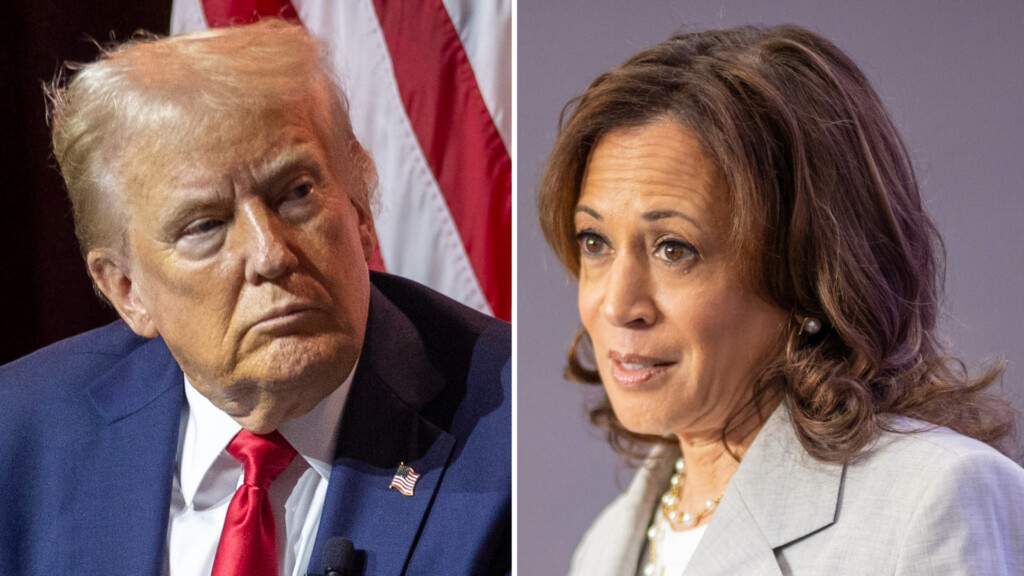
Jacksonville City Council member Terrance Freeman cites the Tax Cuts and Jobs Act of 2017 that Trump signed as one area to earn Black votes. That legislation created opportunity zones where developers can delay paying the capital gains tax earned from their investment in those areas.
That law created 21 Opportunity Zones in Duval County in areas like the Eastside, North Riverside, Brentwood and portions of Grand Park.
Freeman was among the nearly 100 conservatives who met in San Jose last month to discuss faith, family, freedom and ways to engage with more Black voters this election season.
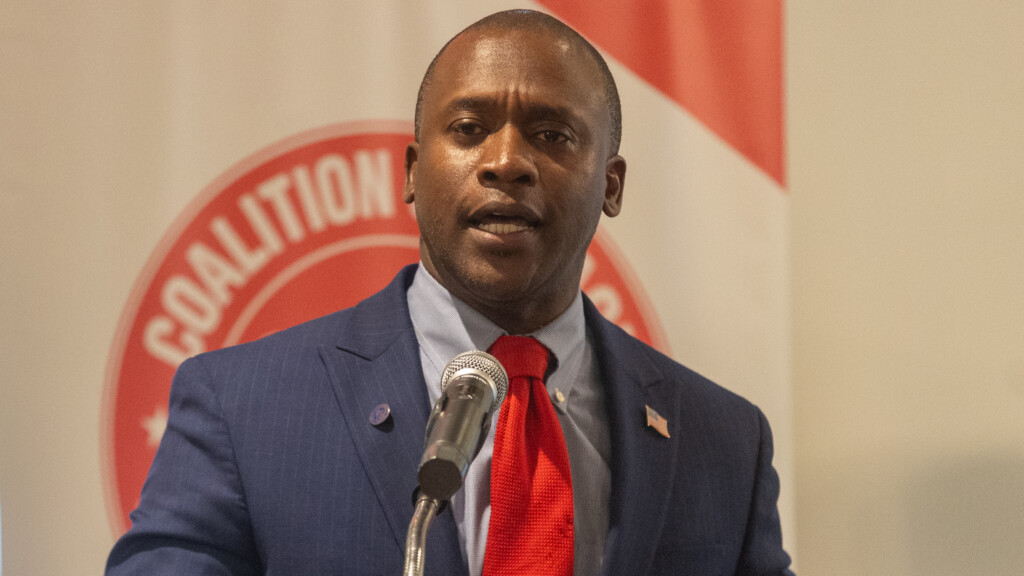
Afterward, Freeman said this is the most important time in America’s history.
“What’s going to be revealed over the course of time is one candidate has proven that he’s got the policies that help the Black community,” Freeman said July 25. “We’re yet to see what the other one’s going to offer. But, if we look at the past and we look at the issues that this presumed nominee is putting forward, compared to what has happened in the past, when it comes to policy, I think that it’s going to be, really, no contest.”
Freeman, who spoke with Jacksonville Today prior to Democratic Party’s official nomination of Harris, also indicated support and funding for HBCUs may be a place where Trump can establish a policy separation from Harris.
Austin stated Harris’ history — from joining the Alpha chapter of Alpha Kappa Alpha Sorority Inc. to becoming the first Black and South Asian woman elected as prosecutor in San Francisco to the first woman to serve as Vice President — is an embodiment that anything is possible in America.
“It’s as significant, if not more significant, than when Barack Obama was on the ballot,” Austin says. “Now, you have a woman of color who is on the (presidential) ballot. You’re going to have, if she is elected, the first First Gentleman of any race.
“It’s very significant to be able to see a woman that we identify as a Black woman who (may now) be the first female president. If anyone predicted a first female president, we assumed it would be a white woman. It would be very positive for girls all over the world to see that America elected a woman and a Black woman.”
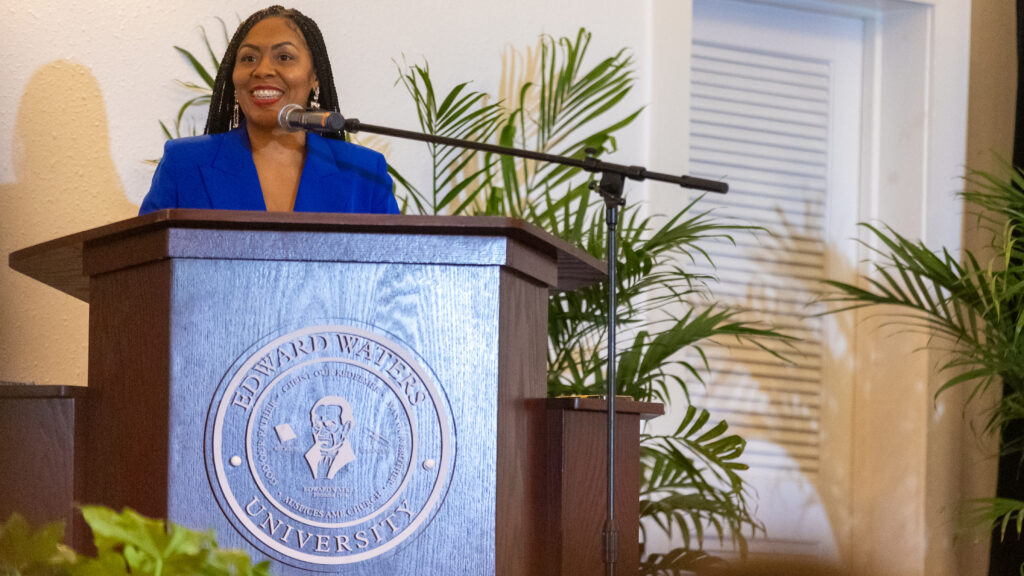
Regardless of who wins this November, Anthony says its not enough to vote. Speaking in support of policy, or against it, is just as important. She cites Randolph’s persistence as an example for all voters.
“A. Philip Randolph planned a March on Washington in the 1940s. It did not occur, though it was not a failure because (President Truman) signed off on desegregating the military. This was the first form of integration in the United States. Some historians argue this is the pivotal point in the start of the second Civil Rights movement.”
While it’s impossible to know which political movement will take root after this election, one thing is certain: Black voters will be courted to ensure electoral victory.



